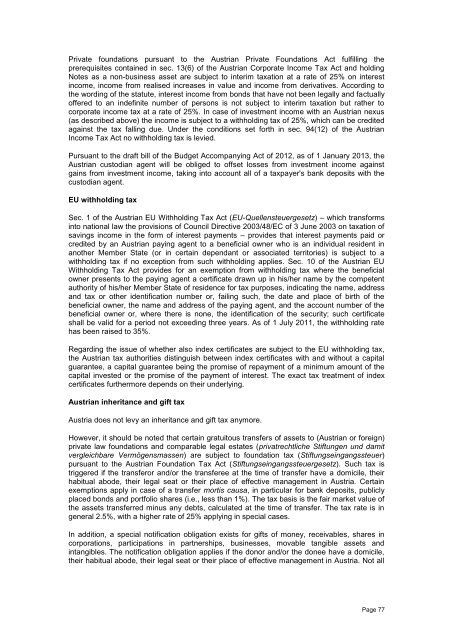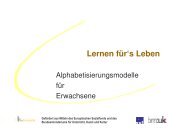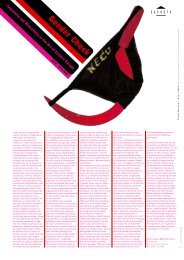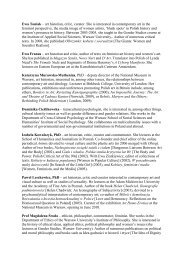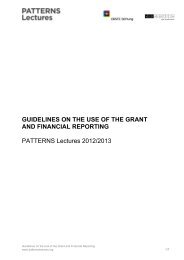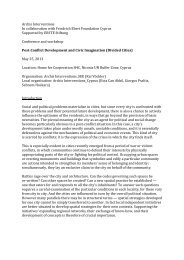DIE ERSTE österreichische Spar-Casse ... - ERSTE Stiftung
DIE ERSTE österreichische Spar-Casse ... - ERSTE Stiftung
DIE ERSTE österreichische Spar-Casse ... - ERSTE Stiftung
You also want an ePaper? Increase the reach of your titles
YUMPU automatically turns print PDFs into web optimized ePapers that Google loves.
Private foundations pursuant to the Austrian Private Foundations Act fulfilling the<br />
prerequisites contained in sec. 13(6) of the Austrian Corporate Income Tax Act and holding<br />
Notes as a non-business asset are subject to interim taxation at a rate of 25% on interest<br />
income, income from realised increases in value and income from derivatives. According to<br />
the wording of the statute, interest income from bonds that have not been legally and factually<br />
offered to an indefinite number of persons is not subject to interim taxation but rather to<br />
corporate income tax at a rate of 25%. In case of investment income with an Austrian nexus<br />
(as described above) the income is subject to a withholding tax of 25%, which can be credited<br />
against the tax falling due. Under the conditions set forth in sec. 94(12) of the Austrian<br />
Income Tax Act no withholding tax is levied.<br />
Pursuant to the draft bill of the Budget Accompanying Act of 2012, as of 1 January 2013, the<br />
Austrian custodian agent will be obliged to offset losses from investment income against<br />
gains from investment income, taking into account all of a taxpayer's bank deposits with the<br />
custodian agent.<br />
EU withholding tax<br />
Sec. 1 of the Austrian EU Withholding Tax Act (EU-Quellensteuergesetz) – which transforms<br />
into national law the provisions of Council Directive 2003/48/EC of 3 June 2003 on taxation of<br />
savings income in the form of interest payments – provides that interest payments paid or<br />
credited by an Austrian paying agent to a beneficial owner who is an individual resident in<br />
another Member State (or in certain dependant or associated territories) is subject to a<br />
withholding tax if no exception from such withholding applies. Sec. 10 of the Austrian EU<br />
Withholding Tax Act provides for an exemption from withholding tax where the beneficial<br />
owner presents to the paying agent a certificate drawn up in his/her name by the competent<br />
authority of his/her Member State of residence for tax purposes, indicating the name, address<br />
and tax or other identification number or, failing such, the date and place of birth of the<br />
beneficial owner, the name and address of the paying agent, and the account number of the<br />
beneficial owner or, where there is none, the identification of the security; such certificate<br />
shall be valid for a period not exceeding three years. As of 1 July 2011, the withholding rate<br />
has been raised to 35%.<br />
Regarding the issue of whether also index certificates are subject to the EU withholding tax,<br />
the Austrian tax authorities distinguish between index certificates with and without a capital<br />
guarantee, a capital guarantee being the promise of repayment of a minimum amount of the<br />
capital invested or the promise of the payment of interest. The exact tax treatment of index<br />
certificates furthermore depends on their underlying.<br />
Austrian inheritance and gift tax<br />
Austria does not levy an inheritance and gift tax anymore.<br />
However, it should be noted that certain gratuitous transfers of assets to (Austrian or foreign)<br />
private law foundations and comparable legal estates (privatrechtliche <strong>Stiftung</strong>en und damit<br />
vergleichbare Vermögensmassen) are subject to foundation tax (<strong>Stiftung</strong>seingangssteuer)<br />
pursuant to the Austrian Foundation Tax Act (<strong>Stiftung</strong>seingangssteuergesetz). Such tax is<br />
triggered if the transferor and/or the transferee at the time of transfer have a domicile, their<br />
habitual abode, their legal seat or their place of effective management in Austria. Certain<br />
exemptions apply in case of a transfer mortis causa, in particular for bank deposits, publicly<br />
placed bonds and portfolio shares (i.e., less than 1%). The tax basis is the fair market value of<br />
the assets transferred minus any debts, calculated at the time of transfer. The tax rate is in<br />
general 2.5%, with a higher rate of 25% applying in special cases.<br />
In addition, a special notification obligation exists for gifts of money, receivables, shares in<br />
corporations, participations in partnerships, businesses, movable tangible assets and<br />
intangibles. The notification obligation applies if the donor and/or the donee have a domicile,<br />
their habitual abode, their legal seat or their place of effective management in Austria. Not all<br />
Page 77


